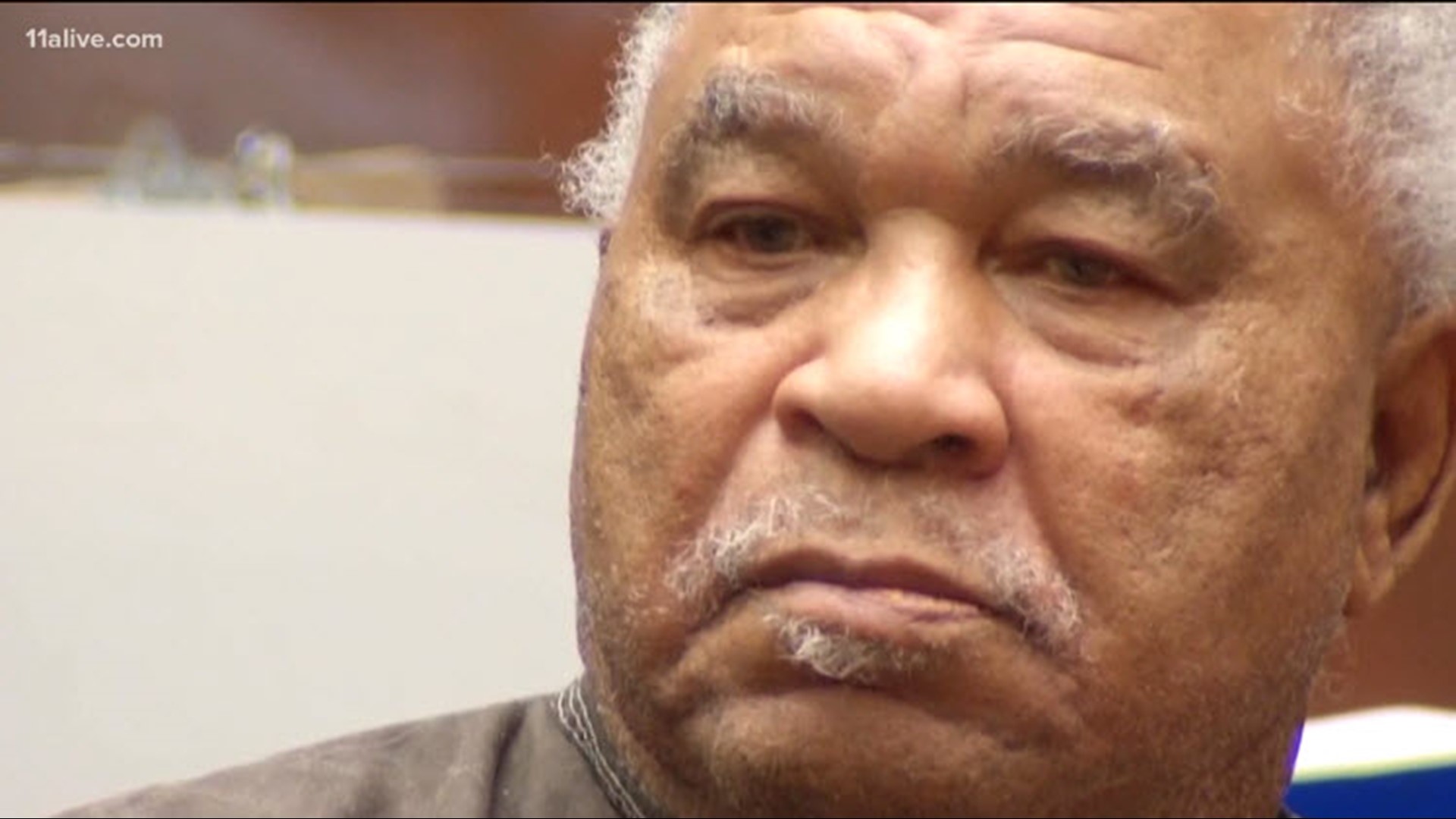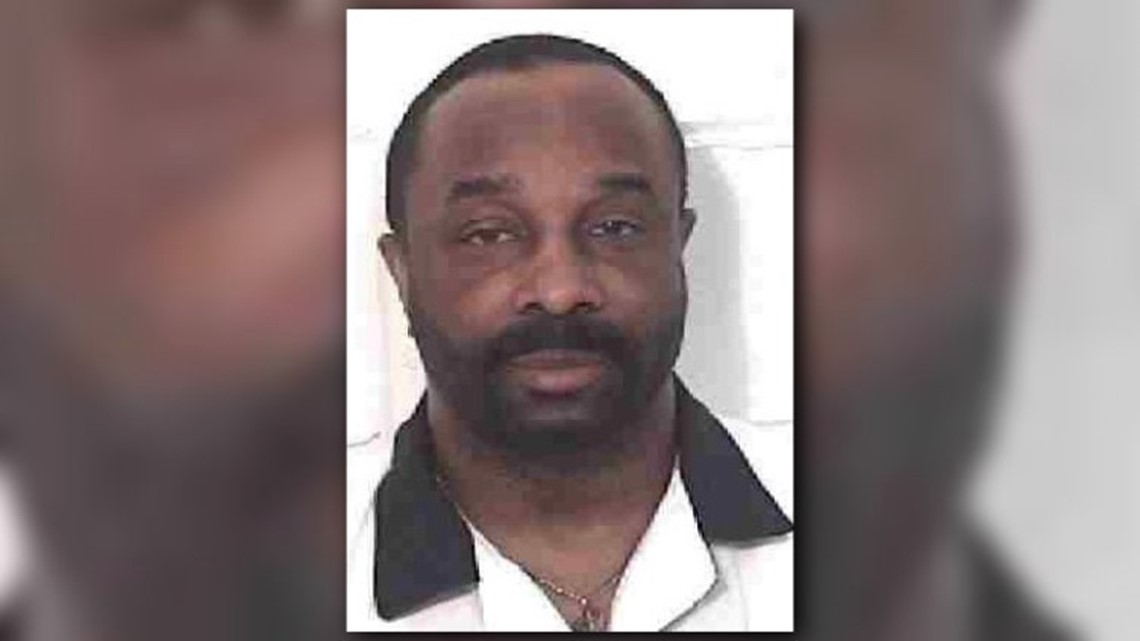ATLANTA – The FBI has confirmed that a man who claims to be the most prolific serial killer in U.S. history has confessed to more than a half-dozen murders in the state of Georgia, including three in Atlanta.
Samuel Little made national headlines earlier this month when he confessed to nearly a hundred unsolved murders across the country from California to Florida between the 1970s through 2005.
The FBI has connected several of Little’s dots, confirming online via ViCAP, that at least seven murdered women in Georgia were part of his confession. At least two of those cases have been positively linked to him.
“The biggest lesson in this case is the power of information sharing. These connections all started in our database of violent crime,” said Kevin Fitzsimmons, ViCAP supervisory crime analyst for the FBI.

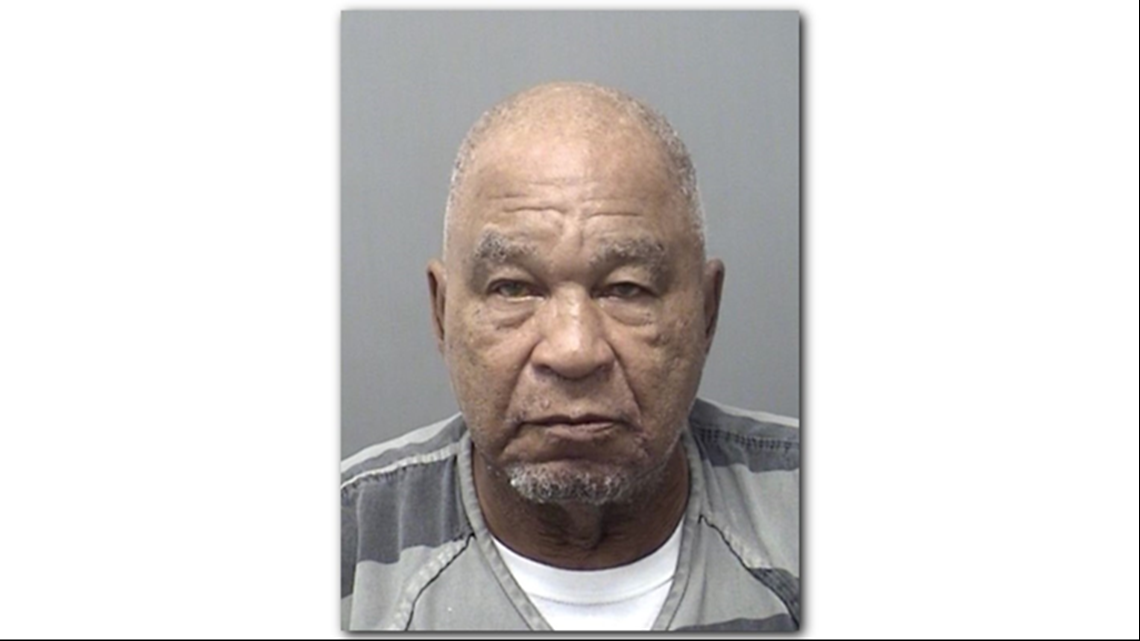
Samuel Little’s Georgia confessions*:
(*Indicates confirmed cases linked to Little by the FBI as of Nov. 15, 2018.)
- Atlanta, 1981, black female, 35-40 years old
- Atlanta, 1983 or 1984, white female, 26 years old (possibly from Griffith, Ga.)
- Atlanta, 1984, black female, 23-25 years old, possibly a college student
- Savannah, 1974, black female, 22-23 years old
- Savannah, 1984, black female, 23 years old
- *Macon: 1977, black female, 30-40 years old (matched to a Jane Doe)
- *Dade County, 1980 or 1981, black female, 25-30 years old (matched to a Jane Doe)
While the FBI is acknowledging his seven Georgia confessions, there may be at least one more victim in Macon that Little confessed to.
Two Bibb County Sheriff's Office investigators traveled to Texas to interview Little, who told them about two murders he committed in Macon—one in 1977 and another in 1982.
He confessed to the strangulation death of Fredonia Smith on Aug.19, 1982 near Washington Park, according to a report from our Macon station, WMAZ.
Atlanta Police Department detectives are working to confirm his Atlanta-based confessions.
"We are collaborating with other agencies and working to determine whether Samuel Little is linked to any crimes in the city," said APD officer Lisa Bender.
To date, the 78-year-old convicted murderer has confessed to more than 90 murders in 14 states.
And so far, FBI ViCAP has confirmed 34 of the confessions, bringing Little closer as the most prolific serial killer in U.S. history.
Gary Leon Ridgway, a.k.a. the “Green River Killer” currently holds that title with 48 confirmed murders. That 69-year-old convicted killer confessed to killing 71 women in and around the Seattle, Wash., area between the 1980s and ’90s.
Little is currently behind bars in a Texas prison for allegedly killing an Odessa woman.
“If all of these are confirmed, I mean, he'll be the most prolific serial killer, with confirmed killings, in American history,” said Bobby Bland, the district attorney for Ector County, Texas.
Bland’s office is prosecuting Little for murdering Denise Brothers, an Odessa woman, in 1994. Little was charged with Brothers’ murder in July 2018 and was extradited from California to Texas. He is currently in the Ector County Jail and expected back in court on Nov. 26.

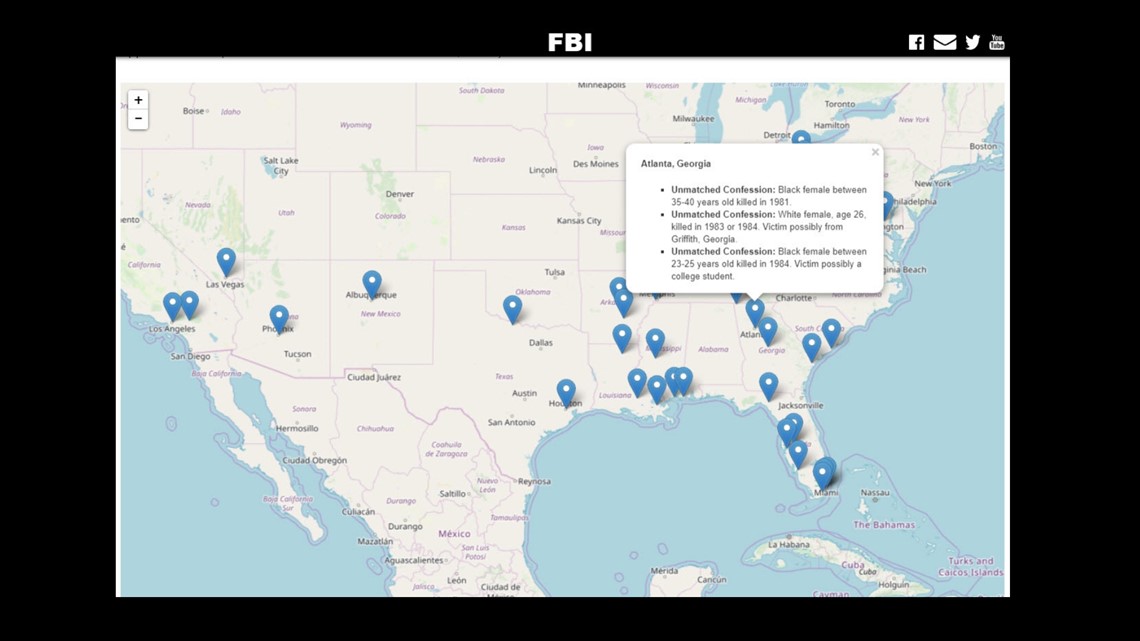
Little has, for years, been a possible suspect in multiple murders across the country.
Bland said the Texas Rangers started looking into Little’s connection to other cold case murders once his 2014 convictions in California were upheld on appeal. Little began to talk to one of the Rangers, and for the first time confessed to murdering Brothers and 90 others.
The Texas Rangers investigation, a coordination between the FBI, DOJ and law enforcement in California, Florida and Texas, led to the new leads in all those murders.
"We had a Texas Ranger here who specializes in these types of cases," Bland said in an interview with 11Alive. “He was the first person to get a confession from him regarding any of these murders.”
Little has provided details in more than 90 murders committed in 14 states, including: Georgia, Florida, Texas, Kentucky, Tennessee, Mississippi, Louisiana, Illinois, Ohio, California, Indiana, Arizona, New Mexico and South Carolina.
More than 30 of Little’s alleged confessions have, so far, been confirmed by authorities. The Texas Rangers have not released further details about specific murders in Georgia or the other states, Bland said.
Brothers was reported missing on Jan. 1, 1994 and her death was ruled a homicide, but the case went unsolved for more than 24 years, according to NBC.
“We were glad to solve a cold case here, and bring justice to a family here, locally," Bland said. "But the opportunity to bring answers to families from across the nation is truly overwhelming, and the fact that this case, and this unfortunate death, here, could be used to shine a light on so many other deaths across the country, and give answers to other families across the country, is very meaningful.”
Little, also known as Samuel McDowell, was born in Reynolds, Ga., in Taylor County, between Columbus and Macon, in 1940, and grew up in Ohio.
He was first arrested for burglary when he was 16 years old and was a career criminal for most of his life—but somehow managed to elude long stints behind bars.
That is, until 2012 when he was arrested in a Kentucky homeless shelter, according to the FBI.
He was extradited to California for a narcotics charge. Once in custody, the Los Angeles Police Department matched his DNA to three unsolved murders between 1987-89. Those women had been beaten, strangled and dumped in either an alley, a dumpster or a garage.
In 2014, he was convicted for those homicides and sentenced to three consecutive life sentences without the possibility of parole. A jury convicted him in the deaths of Carol Alford, 41, Audrey Nelson, 35, and Guadalupe Apodaca, 46.
And, according to the FBI, Little was charged with killing women in Mississippi and Florida in the early 1980s, but eluded indictment.
The Hunt Series:
11Alive’s Brendan Keefe and Jessica Noll first investigated Atlanta’s unsolved strangulation deaths a year ago in "The Hunt." An investigation in which the APD denied having a past or present-day serial killer murdering women.
But someone had been hunting, strangling, murdering women, dating back to the 1970s.
According to a homicide detective-turned professor and a former data journalist, Atlanta is likely hiding some of the most prolific serial killers in U.S. history, like Little.
They’ve never been caught, and their crimes… left cold.
Numbers, data and an algorithm have done what detectives weren’t able to do—outline the largest cluster of unsolved strangulation murders of women in the nation—more than 130 women, who were strangled or asphyxiated to death, spanning over four decades. Most of these murders were committed within the city of Atlanta; all within the metro area.
Nearly 100 of those cases were reported as unsolved to the FBI.
News once plastered the TV, scrolled across newspapers, warning, informing, questioning.

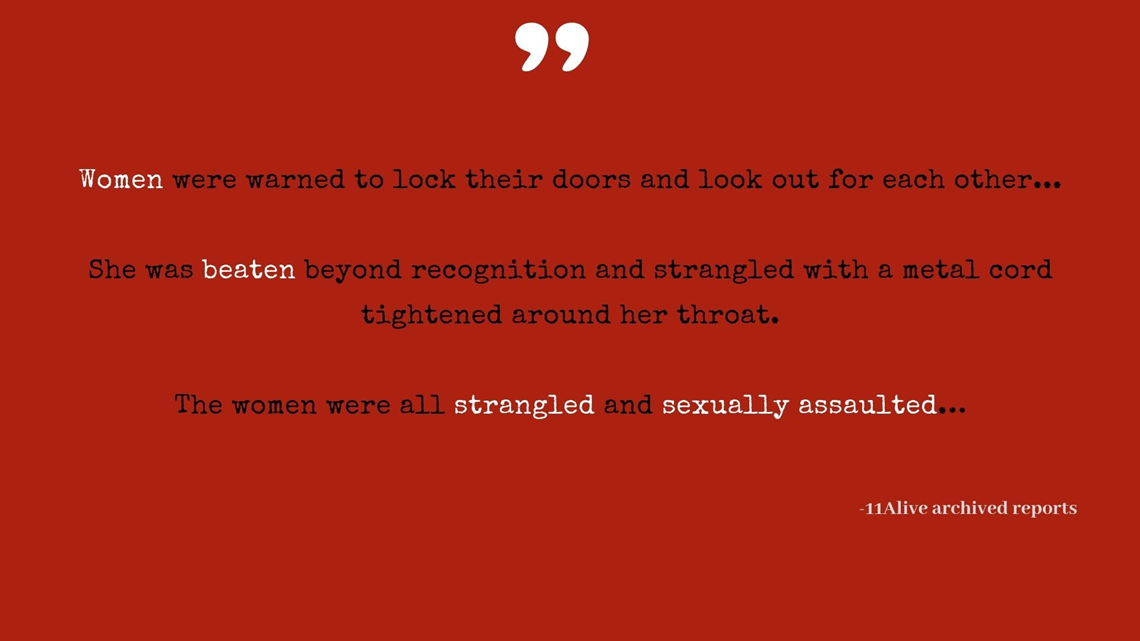
But those reports didn’t lead to any clear-cut connection or illuminate a serial killer’s identity.
No one connected the dots, until a cold case detective-turned professor and a retired data journalist looked at the numbers.
“The public is fascinated with Jeffrey Dahmer, and the Zodiac, and the Son of Sam – the most important killers are the ones that we don’t even know about yet,” said Michael Arntfield, a former detective who leads The Cold Case Society in Canada shedding light on these cases—and making those connections.
“The most prolific serial strangler in American history, or multiple offenders operating in the same city with the same M.O. at the same time – all undetected,” he said.
Arntfield and the Cold Case Society study Thomas Hargrove’s eye-opening data.
Hargrove, a former journalist and the founder of the Murder Accountability Project, a non-profit in Washington, D.C., created an algorithm from not only FBI homicide data, but from police departments nationwide—and now is the most complete homicide database in the nation.
Math has done what forensics could not—create a pattern and pinpointing probable serial killers. And it’s his algorithm that signaled an alert over an Atlanta strangulation cluster spanning several years.


The victims of Atlanta’s unsolved murders now live only as zeros and ones on a computer hard drive in Hargrove’s home office in Alexandria, Va.
“We’ve assembled records now on 751,000 murders in the United States. And what the algorithm does is try to group those murders into meaningful clusters of murders,” Hargrove said to 11Alive in 2017, as he scrolled across his computer screen full of colorful dots symbolizing killings nationwide.
The Murder Accountability Project mines the data, exploring connections between homicides across the country and creates clusters, indicating plausible serial killers. The algorithm seeks for similarities between who was murdered, how they were killed, where and when.
And the biggest cluster in the nation is Atlanta’s strangulation murders.

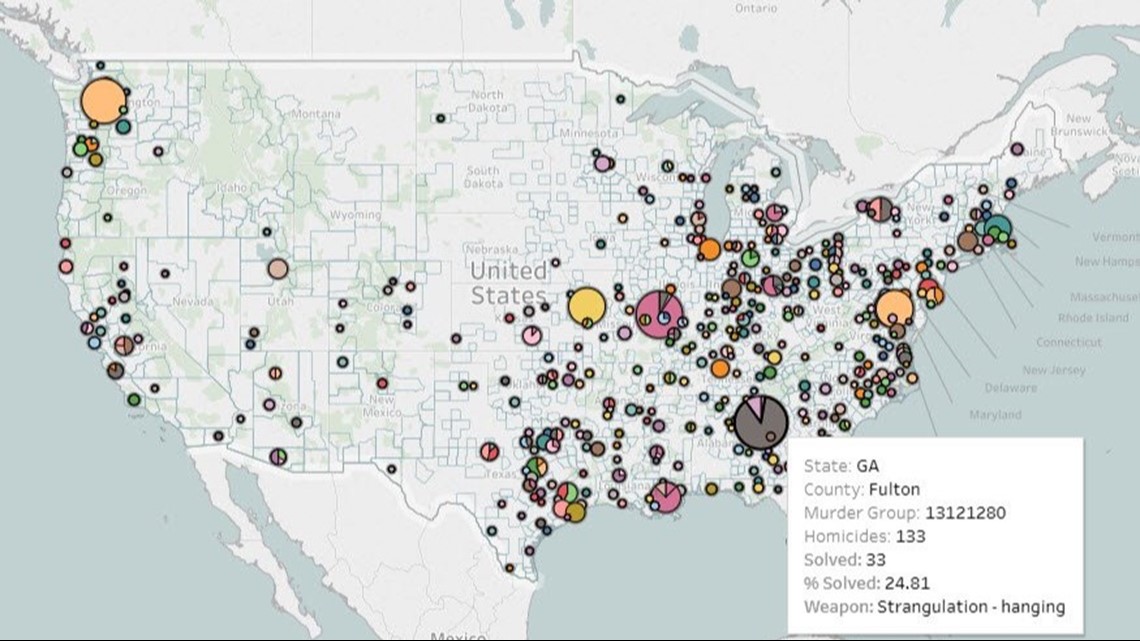
But, why couldn’t this just be a series of random events perpetrated by multiple individuals?
Approximately five percent of murders are by strangulation—however, 25 percent of serial killers’ M.O. is strangulation, he said.
“Why do we feel pretty confident that you have multiple serial killers in Atlanta? Because of mathematics. Strangulation is relatively rare. It is not rare in Atlanta,” Hargrove said.
“[It’s] by far the largest series in modern history,” Hargrove said. “The odds of this being 133 individual killers who just were astonishingly lucky.”
“I would bet my house that, no, there are multiple serial killers at work, and they were very successful.”
The vast majority of those cases remain unsolved.
In the mid-90s, nine Atlanta prostitutes were murdered. Back then, the city was looking for a serial strangler. But at least five individual killers were eventually arrested.
The killings continued, and multiple cases remain unsolved.
“It’s almost as if you had a convention of serial killers who were stranglers, and you had them in Atlanta over many, many years,” Hargrove said.
And Atlanta, according to him, is unlike any other city.
“What is breathtaking is how these murders are quite different than what happens in most of America,” Hargrove said about other cities’ strangulation murders of women.
“About 80 percent of murders of women are solved. Someone is arrested. That’s because most women are killed by intimates – a boyfriend or a husband. Most of the time we get the guy who kills women. In this particular cluster, that hardly ever happened.”
Arntfield, who is also on the Murder Accountability Project board of directors, is a professor of criminology at Ontario’s Western University.
He and his student volunteers, who are part of the Cold Case Society, based in London, Ontario, are working with Atlanta investigators to confirm links between the killings, and to identify possible serial killers who were previously unknown to police.
From 1985 to 2016, there were 97 strangulation victims, and only 22 of the murders had been solved by the time of the report to the FBI for those years.
While most of these murders occurred before Arntfield’s students were born, they have the opportunity to approach the cases in a different way than a conventional detective might.
“The first victim in this series of killings, she was found dead March 1 in her apartment. She had been sexually assaulted and smothered with a pillow,” Brikena Qamili, currently a law student and the Atlanta Cluster Team Leader, said looking up from her research on her laptop. “We suspect that one or two serial killers were probably behind that cluster.”
“That’s a huge break, that someone can identify this guy and had a bad date with him,” Arntfield said in the intimate classroom of a half-dozen volunteer students and part of the Cold Case Society.


With cooperation from the Atlanta Police Department, Arntfield said, they have 44 names of victims.
“Now, we can begin doing victim work-ups on, to determine if there’s a common lifestyle characteristic, a common routine activity, if there’s a common neighborhood,” he said.
The team, however, is perplexed by the strangulation murders of more than a dozen elderly women over a 30-year period.
Much like the prostitute murders, there were arrests, but the killings continued sporadically for decades.
“Thirty years is almost unheard of,” Arntfield said.
And that means, multiple serial killers over three decades.
“We have multiples. Within just the sub-set of the elderly victims, and home-invasion strangulations which of themselves are extraordinarily rare,” he concluded.
Do you have a tip or clue that could solve these cold cases? Do you know who the serial killers are? Send 11Alive investigators, Brendan Keefe and Jessica Noll an email at TheHunt@11Alive.com.
Jon Shirek and Lauren Padgett contributed to this report.

